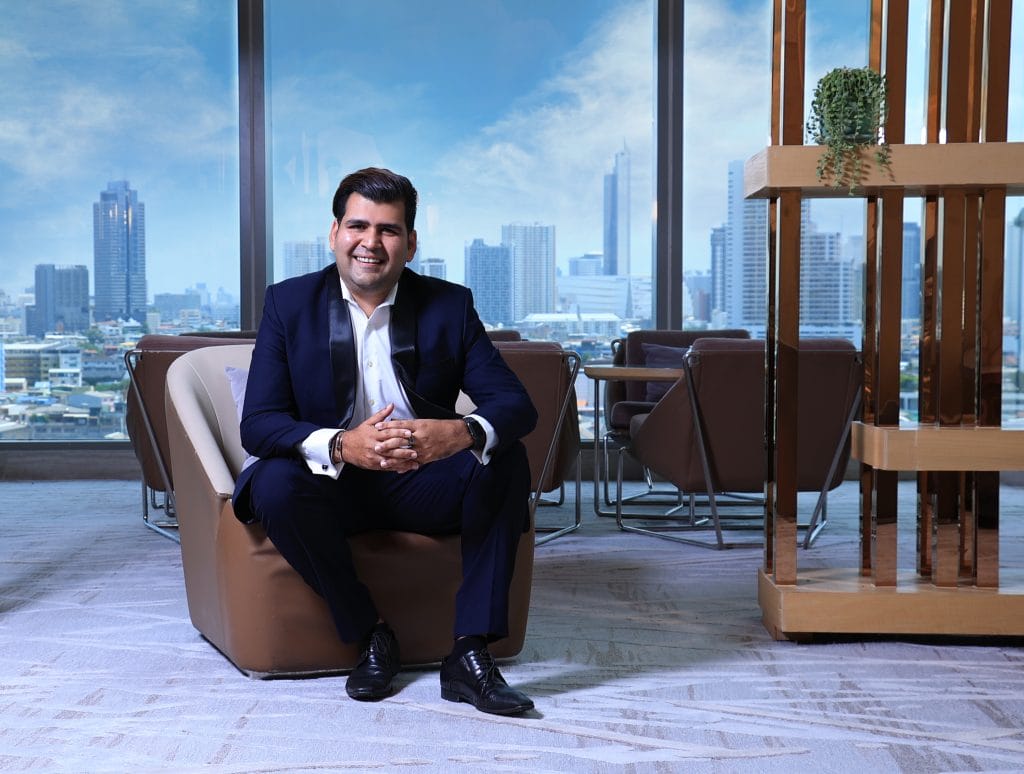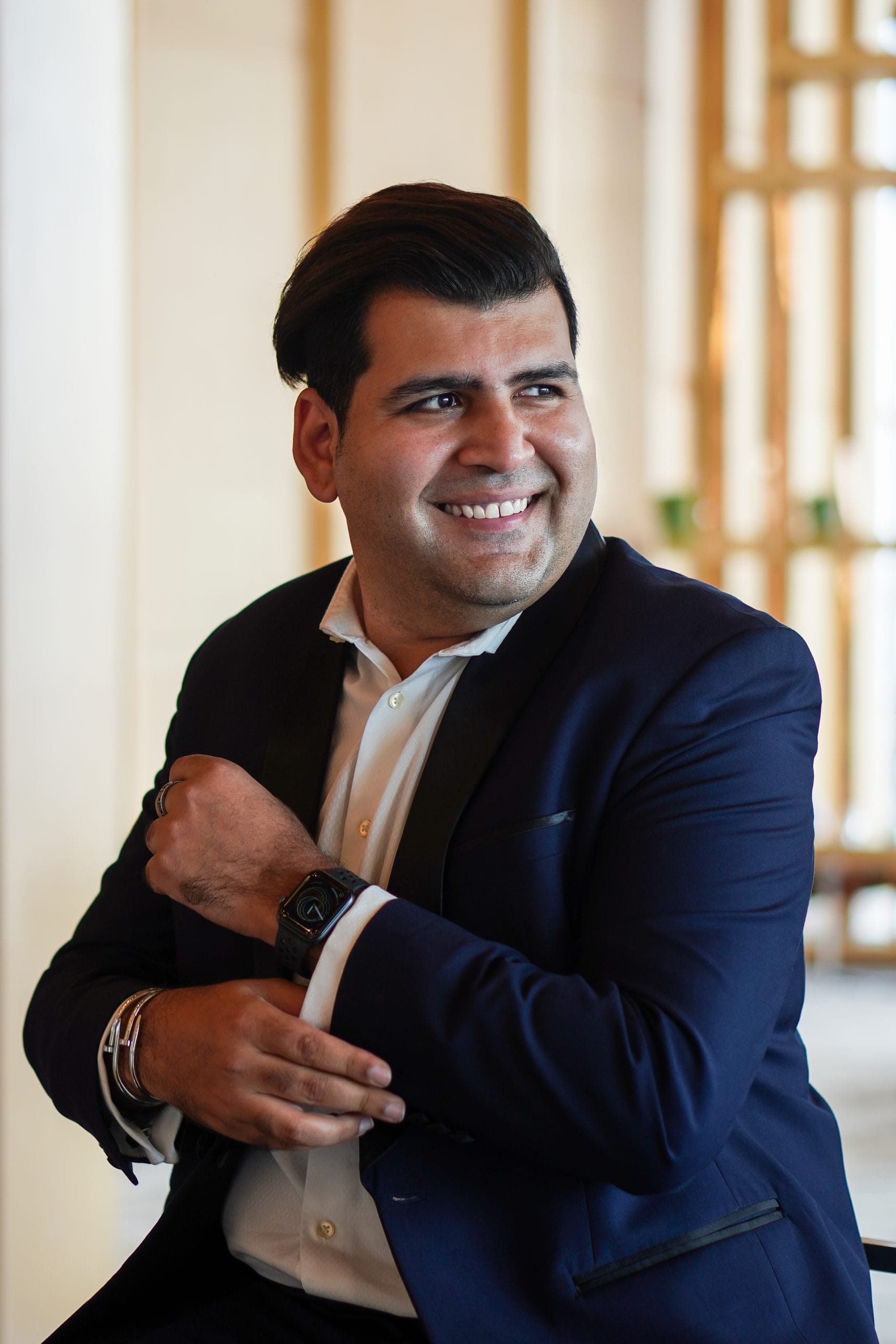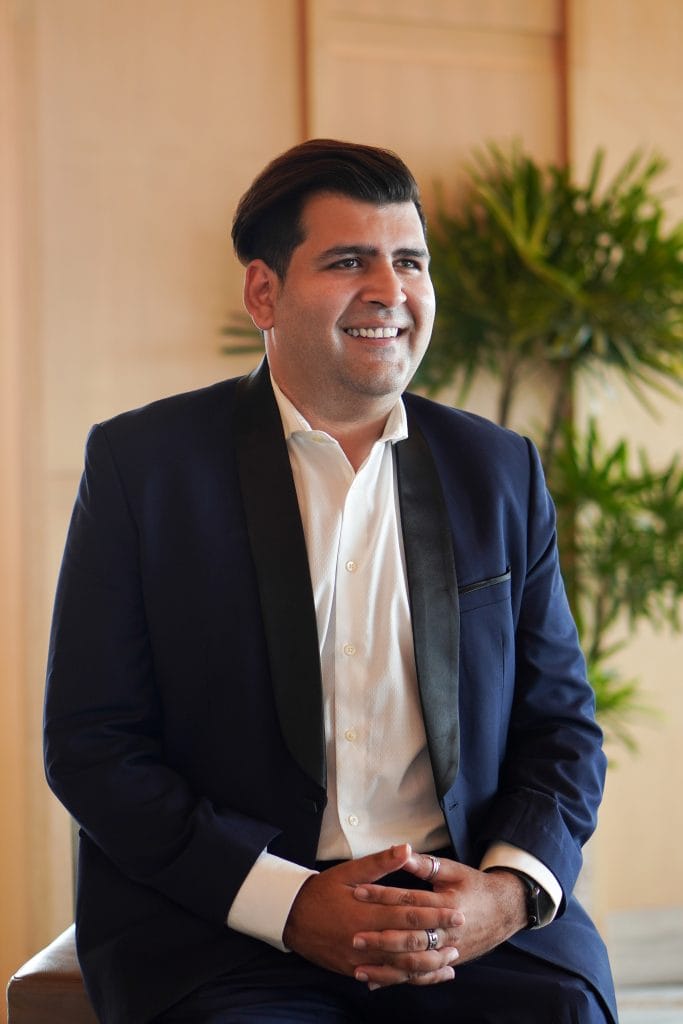How the joys of hospitality are the true selling point of his career.
By Aiden Jewelle Gonzales
When in sales and marketing, often your job boils down to selling ‘the dream’ – be it an aspirational product or service, a not-to-be-missed experience, or even a certain lifestyle. For Ravi Ganglani, the affable Cluster Director of Sales and Marketing (DoSM) at Avani+ Hua Hin Resort and Anantara Hua Hin Resort, selling is the dream. “It’s very rewarding,” he says of his career, and his meteoric rise to his current position. “It’s a glamorous job, where you can meet people from all walks of life, and even travel the world. There’s nothing like that feeling when you strike a great deal that could last you for years, but it’s more than that. Hospitality is all about exceeding expectations.”
This success, however, is hard won, and he tells me of his slow beginnings in the industry, after moving to Australia from Bangkok, for his Bachelor’s in Hotel Management at the International College of Hotel Management (ICHM) in Adelaide. “I did a lot of jobs in Australia – front office, rooms division, the convention centre, but it was nothing at the management level,” he recalls. “I thought maybe it was time to come back to Thailand, hoping that as an international student who had graduated abroad in Australia, jobs would be waiting for me. This was not the case at all!” With a rueful laugh, he admits, “I must have sent my resume to around 80-90 hotels in Thailand, most of whom didn’t even call back; I got maybe around one or two calls. I even told them that I would do anything, including entry-level jobs, because when you start your career, you always need to start at the bottom and make your way up.”
His determination eventually paid off, however – after an interview with the Head of Events at Diethelm Travel, he landed a Destination Management Company (DMC) role on the spot. “I didn’t know what the role entailed,” he says. “My first assignment was to book a river cruisedinner for an incentive trip! But as you progress, you learn on the job, and that’s how I was introduced to the MICE (Meetings, Incentives, Conventions, and Exhibitions) industry.”
It was during this time that he fell in love with sales: “Your ultimate goal when you study hotel management is usually to become General Manager one day. However, after I became a DMC, I would interact with a lot of sales people, and I thought, ‘their job seems interesting, you meet all these new people, and host these nice dinners; it’s a very lavish life.’ So I sent some feelers out.” Through this, he tells me, he landed a job at Royal Orchid Sheraton Hotel & Towers, before moving to Minor Hotels. “I got a call from someone I now consider a dear mentor, Meg Evans,” he recalls. “They were looking for a Director of Sales for Thailand, for Minor’s whole portfoliohere. The interview lasted four and a half minutes, and I thought that was a bad sign. But as I was going down the lift, between the 12th floor and the Ground floor, I got a call telling me I got the job. At one point, I ended up looking after 15-16 hotels in Southeast Asia, for MICE as well, and I got the chance to be the pre-opening DoSM for Avani Sukhumvit Bangkok Hotel in On Nut, before moving on to the two properties in Hua Hin. I haven’t looked back since.”
Ravi speaks to Masala further about how the lure of sales and hospitality go hand in hand with hard work, and why going the extra mile, with a smile, is always important.
You started off as a DMC at a travel company before moving on to hospitality – tell us about what your first hotel was like, and your challenges and learnings with this change in career.
When I moved from Diethelm Travel to Royal Orchid Sheraton, I didn’t know what I was getting myself into. I knew that sales was glamorous, but I didn’t yet know the amount of work we had to do in-house as well, between doing the proposals, bookings, contracts, etc. When I was there, I faced one of my biggest challenges, which was when Thailand experienced its worst floods to date in 2011. We were on the river, so we faced the worst flooding ever – everything was postponed, and we had to learn to navigate that and push through.
Thankfully, I had some great help from my colleagues, who are still some of my best friends today. We helped each other not just with that crisis, but by teaching each other about how different cultures work differently. For example, if you’re working with clients from the US, you’d know that they’d book a year and a half out, but certain countries in Asia, your booking window could be 2-3 days out, even for larger groups, so you have to learnand adapt with the different work cultures.
What led you to Avani/Anantara, and what about their brand philosophy attracted you to them?
I started off when the company was still growing and developing. When I jumped aboard, we just had the first few Avanis, and then we started the Avani+ brand. What I like is that both the brands are Thai brands – that’s important for me; I believe that when you’re in Thailand, you should want to work for a Thai company.
The Anantara brand is very grounded in its roots; wherever you go, anywhere in the world, you’ll still feel the renowned Thai hospitality and Thai touches, but all the properties work with the local surroundings as well. There’s a lot of thoughtfulness put into the brand, including in the logo itself: the two triangles and the water urn symbolise what used to greet you whenever you enter a Thai home, regardless of the person or destination: water to wash your feet, and a triangle pillow to sleep on.
Meanwhile, the Avani brand is a very young, fresh, funky brand, which I was very drawn to. You can be very creative with Avani. While Anantara is more traditional, Avani has a more contemporary edge. And to balance marketing these two brands is a challenge that I really enjoy.
The hospitality industry is not an easy one – especially while going through the pandemic during the last few years. What kept you motivated during this time, and were there times that you thought of quitting the industry altogether?
To be honest, when the pandemic hit, it made me push myself even harder because business was disappearing from every hotel, everywhere. What I had to ensure, while working with my General Managers and my management team, was that we do our best in terms of finding whatever business opportunities there were, whether it was becoming a hospitel, or venturing into the catering business, because the livelihoods of all the staff relied on the business that was coming into the hotel. Knowing this, and knowing them, encouraged me during this time. I told them that when we have clients, our role was to take good care of them, and go the extra mile, and to invest in the little touches that make them smile when they enter the room. Visitors can go to any hotel and get a similar price, but we have to provide the best service, and that is how we stand out.
The industry has faced a lot of changes over the last few years, such as people’s renewed interest in sustainability, and green MICE and tourism. What has your experience been with marketing these new changes?
Firstly, when we look at the Incentive market, especially the groups coming from the US, Europe, and Australia, baked into the contracts are questions like, “what are you doing in terms of sustainability and making sure the hotel stays green?” Luckily, Avani+ Hua Hin has just been awarded the Green Growth 2050 Platinum Standard, the top achievement, while Anantara got the Gold Standard. We are ensuring that we minimise the use of plastic throughout the property, we have recycling bins throughout, we take care of all the details, because customers are now very conscious of these things. And when you see the amount of waste in hotels, it’s quite disheartening, so sustainable measures have to be the way forward. We’ve even taken measures with HR to look at food wastage in staff canteens.
What I’ve observed as well from Indian weddings especially, is that the younger generation are for more concerned about the environment compared to previous generations, especially couples from the US, UK, and Australia, but even some Thai-Indian couples as well. Now, brides are asking me, “what do you do with food wastage?” and, “Can we minimise the number of items, can we do à la minute preparations? What happens to all the décor; can we use more sustainable items that we can recycle or even re-plant?” These are all things that we’ve had to take into consideration over the last few years.
What other market trends do you foresee in the industry?
People are getting more and more tech-savvy. For example in an Indian wedding – you’ll already have 4-5 family members on their phones, on Agoda or Booking. com, comparing prices, etc. They’re tech-savvy, they know the rates, all the promotions we have on social media, even the weekly promotions on F&B, and we have to explain to them that it’s only for a limited time! [Laughs]
People these days also want to see a lot more on social media. They want to see what the whole experience will be like, and what kind of ‘inspiration shots’ they can have at the hotel, so you have to be on top of everything. My team and I are always on social media; we follow all the hotels around us. We do compete in finding business, but we learn from each other as well. When we meet clients who are still looking at wedding destinations, the first thing you have to promote is the destination – there’s no point in talking about rooms, etc. otherwise.
In your capacity as the Cluster Director of Sales and Marketing, what are you and your hotel doing to promote MICE business in Thailand, and what can the country do to bring in more MICE visitors and tourists?
I’m also involved in the Thailand Convention & Exhibition Bureau (TCEB) as one of the Meetings and Incentives Market champions. Coming onboard with them was a great opportunity because I have the
opportunity to discuss with them how to best bring in MICE business, especially in our target markets, which are the US, UK, India, China, Singapore, and Australia. From the hotel side, we also work closely with our global sales, because we have representation throughout the world. We make sure to always keep our existing customers up to date – often that means physically picking up the phone, checking in on them, going back to the basics of sales, and saying, “hey how are you doing, Thailand is open again. These are our promotions and options.”
And another thing is making sure that all the meeting venues are up to standard. For example, our meeting rooms have been awarded the Thailand MICE Venue Standard (TMVS) as well as the ASEAN MICE Venue Standard (AMVS). And make sure your MICE facilities have visibility on your homepage or website.
We’re fortunate that when working with Minor, the company grows and evolves constantly, and we’ve now got representation in a lot of countries that we haven’t before, including access to new customers and new databases, which means more opportunities.
You’ve achieved so much at such a young age – which accomplishments are you most proud of, and conversely, what is one challenge that you’re still learning to overcome?
I’m honoured is that Minor has recognised my hard work, and I was awarded the Minor Award two years in a row for Sales and Marketing, because we achieved the highest MICE numbers for two years straight. That was a great accomplishment for me.
One of the challenges I’ve had was that I’ve always been known as the MICE guy, so even when I want to break into something else, that’s often what I’m reduced to. I still like it, but I do want to be known for other things too.
You’ve mentioned that you wouldn’t be here without those who’ve helped you along the way – who would you consider your most influential mentors, and on the other hand, what advice would you give to your mentees?
Over the last 10 years I’ve had two big mentors, both of whom have worked with Minor. The first was Meg Evans, whom I’ve mentioned before, and who unfortunately passed away a couple of years ago. She was the Regional Director of Sales and Marketing, and she was fundamental in my development, and she helped me get to the position I am today. The second is my current GM, Naowarat ‘Bee’ Arunkong. Khun Bee was the first who said I could do a lot more than just being in sales, she’s helped pushed me towards operations, and she said I could be the next GM some day; she trained me and guided me. They’re both very strong women, who give you the respect that you’re due, but they’re also tough.
As for anyone who wants to follow in my footsteps – it’s a very fun job, but you have to open up to hard work. It’s going to be tough, but it’s very rewarding. I have no regrets.









